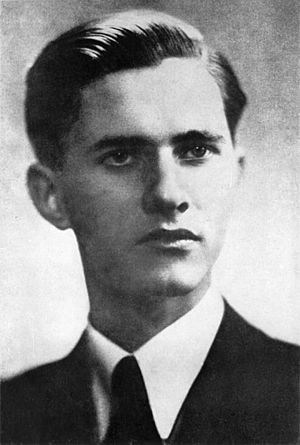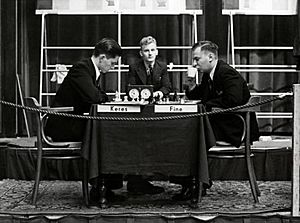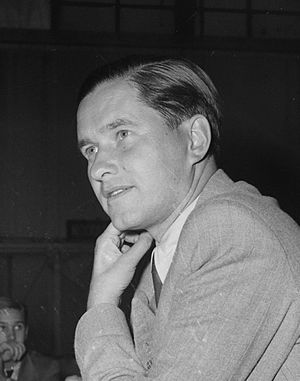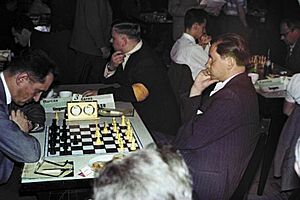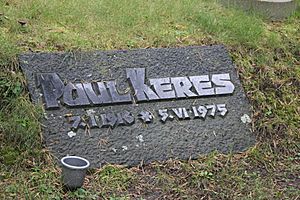Paul Keres facts for kids
Quick facts for kids Paul Keres |
|
|---|---|
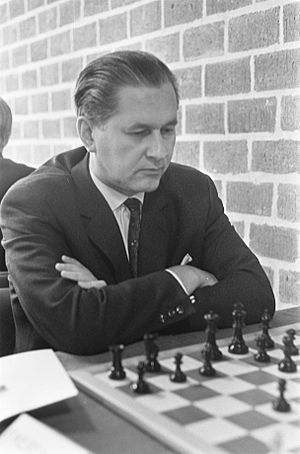
Keres in 1969
|
|
| Country | Estonia (under Nazi German 1941–44, and Soviet occupations 1940–1941, after 1944) |
| Born | January 7, 1916 Narva, Russian Empire (now Estonia) |
| Died | June 5, 1975 (aged 59) Helsinki, Finland |
| Title | Grandmaster (1950) |
| Peak rating | 2615 (July 1971) |
Paul Keres (7 January 1916 – 5 June 1975) was a famous Estonian chess grandmaster and writer. A grandmaster is the highest title a chess player can get. He was one of the best players in the world for about 30 years, from the mid-1930s to the mid-1960s.
Paul Keres almost got to play for the World Chess Championship five times. This is the biggest prize in chess. During World War II, Estonia was taken over by different countries. Because of this, Keres had to play for both the Soviet Union and Nazi Germany in international chess events.
Keres won a big tournament called AVRO 1938 chess tournament in 1938. This win meant he could challenge the world champion, Alexander Alekhine. But the match never happened because World War II started in 1939. Keres also finished second four times in a row in the Candidates Tournament (1953–1962). This tournament decides who gets to challenge the world champion.
Because of his amazing results, many chess experts think Keres was one of the greatest players ever. They also say he was the strongest player who never became a world champion. He was sometimes called "Paul the Second" or "The Crown Prince of Chess."
Contents
- Early Life and Chess Beginnings
- Playing for Independent Estonia
- World Championship Dream Denied
- Life During World War II
- Challenging for the World Championship (1948–1965)
- Three-Time Champion of the USSR
- International Team Successes
- Later Career and Achievements
- Death
- Memory and Memorials
- Images for kids
- Chess Legacy and Writings
- Notable Games
- Tournament and Match Records
- See also
Early Life and Chess Beginnings
Paul Keres was born in Narva, a town that is now in Estonia. When he was two years old, Estonia became an independent country. His father and older brother, Harald, taught him how to play chess. Harald later became a famous scientist.
There weren't many chess books where Keres lived. So, he learned about chess notation (how to write down chess moves) from puzzles in newspapers. He even collected almost 1,000 chess games by hand! When he was young, he was known for playing in a very exciting and attacking way.
Playing for Independent Estonia
Keres was a champion schoolboy chess player in Estonia three times. He got much better at chess by playing many correspondence chess games. This is where players send their moves to each other, often by mail. He played about 500 such games and sometimes had 150 games going at once! In 1935, he won an international correspondence chess championship.
In 1935, Keres became the champion of Estonia for the first time. He played for Estonia's top team at the 6th Chess Olympiad in Warsaw in 1935. People saw him as a new star because of his bold playing style. This success made him confident to play in bigger international tournaments.
Keres had many great results in 1937. He won tournaments in Tallinn, Margate, and Prague. He also won a special tournament in Vienna where all games started with the same chess moves. These wins helped him get invited to the Semmering–Baden tournament in 1937, which he also won. After this, he was seen as a top player, even though the official Grandmaster title didn't exist yet.
He continued to play well for Estonia in the Chess Olympiads. In 1939, Estonia won a team bronze medal, which was a huge achievement for a small country.
- Warsaw 1935: Played on board 1 for Estonia.
- Munich 1936 (unofficial): Won a gold medal for his board performance.
- Stockholm 1937: Won a silver medal for his board performance.
- Buenos Aires 1939: Helped Estonia win a team bronze medal.
World Championship Dream Denied
In 1938, Keres tied for first place with Reuben Fine at the AVRO tournament in the Netherlands. This was one of the strongest chess tournaments ever, with many of the world's best players. Keres won the tie-break because he beat Fine in their individual games.
The winner of the AVRO tournament was supposed to challenge the World Champion, Alexander Alekhine. However, World War II started in 1939, and Estonia was taken over by the Soviet Union in 1940. These events stopped the match from happening. Keres was also studying at university, which made it harder to arrange the match.
Life During World War II
During World War II, Estonia faced many changes. It was first taken over by the Soviet Union in 1940. Then, Nazi Germany invaded in 1941 and controlled Estonia until 1944. After that, the Soviet Union took control again, and Estonia remained part of the Soviet Union for the rest of Keres' life.
When the war started in 1939, Keres was in Argentina for the Chess Olympiad. He stayed there to play in another tournament and tied for first place. He then played a match against former World Champion Max Euwe and won. This was a great win because Euwe was a very experienced player.
Under Soviet and German Control
When the Soviet Union first took over Estonia in 1940, Keres played in his first Soviet Championship. He finished fourth, which was a good result against very strong players. In 1941, he came second in the "Absolute Championship of the USSR," behind Mikhail Botvinnik.
When Nazi Germany controlled Estonia (1941–1944), Keres played in several tournaments organized by the Germans. He often finished second to World Champion Alekhine. He also won the Estonian Championship twice during this time.
After the Soviet Union took control of Estonia again in 1944, Keres tried to escape to Western Europe but couldn't. Because a newspaper interview with him from 1942 was used by the Nazis for propaganda, Soviet officials questioned him. Luckily, he avoided serious punishment.
He returned to playing chess internationally in 1946 and continued to play very well. He won the Estonian Championship in 1945 and the Baltic Championship in 1944/45.
Challenging for the World Championship (1948–1965)
After World Champion Alekhine died in 1946, a tournament was held in 1948 to decide the new world champion. Keres was one of the five top players invited. He finished third. Some people wondered if Keres was forced to lose games to Botvinnik, who won the tournament. However, chess historians have looked into this and believe Keres probably did not lose games on purpose.
Keres finished second or tied for second in the Candidates' Tournament four times in a row (1953, 1956, 1959, 1962). This is why he was sometimes called "Paul II" or "The Eternal Second." He played in six Candidates' Tournaments in total.
- Zürich 1953: Tied for 2nd–4th place.
- Amsterdam 1956: Finished 2nd.
- Yugoslavia 1959: Finished 2nd, even though he beat the winner, Mikhail Tal, in their individual games.
- Curaçao 1962: Tied for 2nd–3rd place.
In 1965, Keres lost his first-ever match in the Candidates' Tournament to Boris Spassky. This was his only match loss in his long career.
Three-Time Champion of the USSR
Keres was incredibly successful in other tournaments. He won the very strong USSR Chess Championship three times:
- 1947 in Leningrad.
- 1950 in Moscow.
- 1951 in Moscow, beating many of the world's top players.
He also won other major tournaments, like Budapest in 1952. In this event, he finished ahead of the world champion, Botvinnik. Some experts believe this period was the peak of Keres' career, and he was the best player in the world.
International Team Successes
After Estonia became part of the Soviet Union, Keres played for the Soviet team in seven straight Chess Olympiads. He helped the team win seven gold medals in a row. He also won five individual gold medals for his performance on his board. Keres was the only Soviet player with Olympiad experience when the USSR first joined in 1952.
His record in the Olympiads was amazing: out of 161 games, he won 97, lost only 13, and drew 51.
Keres also played for the Soviet Union in the European Team Championships three times. Each time, he won both a team gold medal and an individual gold medal. He was a very important player for the Soviet Union's success in team events.
Later Career and Achievements
Keres continued to play at a very high level in international tournaments for many years. He also helped organize chess events in Estonia.
He won many more tournaments, including:
- Hastings 1954–55 (tied with Vasily Smyslov).
- Mar del Plata 1957.
- Hastings 1957–58.
- Beverwijk 1964 (tied with Iivo Nei).
- Buenos Aires 1964 (tied with World Champion Tigran Petrosian).
- Hastings 1964–65.
- Bamberg 1968 (two points ahead of World Champion Petrosian).
- Budapest 1970.
- Tallinn 1971 (tied with Mikhail Tal).
His last major tournament win was in Tallinn in 1975, just a few months before he passed away.
Death
Paul Keres died from a heart attack in Helsinki, Finland, when he was 59 years old. He was on his way back to Estonia after winning a tournament in Vancouver, Canada.
More than 100,000 people attended his funeral in Tallinn, Estonia. His old friend and rival, Max Euwe, who was then the president of the World Chess Federation (FIDE), was also there.
Memory and Memorials
Paul Keres is still remembered as a national hero in Estonia.
- There is a statue honoring him in Tõnismägi, Tallinn.
- Another bronze statue was put up in his hometown of Narva on his 100th birthday in 2016.
- A street in Tallinn is named after him.
- His picture was on the five kroons banknote before Estonia started using the euro in 2011.
An international chess tournament called the Paul Keres Memorial Tournament has been held in Tallinn every other year since 1976. Keres himself won this tournament in 1971 and 1975. There are also Keres Memorial tournaments held in Vancouver and other places.
In 2000, Paul Keres was chosen as the Estonian Sportsman of the Century. The World Chess Federation (FIDE) named 2016 "The Year of Paul Keres" to celebrate his 100th birthday.
Images for kids
-
USSR postage stamp issued in 1991 to honor Keres
Chess Legacy and Writings
Paul Keres is considered one of the top chess players in history. He had a winning record against many famous players, including José Raúl Capablanca, Max Euwe, and Mikhail Tal. He also drew his games against Vasily Smyslov, Tigran Petrosian, and Anatoly Karpov. Keres played against 10 different world champions and beat 9 of them at least once. Only two other players have achieved this!
He wrote several important chess books that are still used by players today:
- Grandmaster of Chess (a collection of his best games).
- The Art of the Middle Game (with Alexander Kotov), which teaches how to play during the main part of a chess game.
- Practical Chess Endings, about how to play the end of a chess game.
Keres also made many new ideas in chess opening theory. An opening is the first few moves of a chess game. One of his most famous ideas is the Keres Attack in the Sicilian Defence, which is still used today. He also helped create the chess magazine Shakhmaty.
Keres won top-level tournaments for 40 years, from the mid-1930s to the mid-1970s. He won events in many different parts of the world.
His rival, Samuel Reshevsky, once said that Keres didn't become world champion because he was "too mild a person." Reshevsky described Keres as a kind and friendly person who loved chess but cared more about being a good human being. Besides chess, Keres also enjoyed tennis, ping-pong, swimming, and bridge.
Notable Games
Here are some of Keres' most famous games:
- Keres vs. Alexander Alekhine, Margate 1937: Keres played better than Alekhine from the start and used clever combinations to win.
- Keres vs. José Raúl Capablanca, AVRO Amsterdam 1938: Keres' knight made surprising moves that slowly broke down Capablanca's position.
- Max Euwe vs. Keres, Amsterdam 1940: Keres used brilliant tactical moves to win against the former world champion.
- Keres vs. Mikhail Botvinnik, Moscow 1956: Keres showed great positional play to defeat the world champion.
- Keres vs. Edgar Walther, Tel Aviv 1964: Keres introduced a new plan in the King's Indian Defence opening, using a sacrifice to win.
Tournament and Match Records
Here is a list of some of Paul Keres' most important tournament and match results:
Tournaments
| Year | Tournament | Place | Notes |
|---|---|---|---|
| 1935 | Warsaw 6th Olympiad | – | Played on top board for Estonia |
| 1936 | Nauheim | 1–2 | Tied with Alekhine |
| 1937 | Margate | 1–2 | Tied with Fine |
| 1937 | Prague | 1 | Won the tournament |
| 1937 | Semmering/Baden | 1 | Won ahead of Fine |
| 1938 | AVRO | 1–2 | Tied with Fine, ahead of Botvinnik |
| 1939 | Margate | 1 | Won ahead of Capablanca |
| 1939 | Buenos Aires 8th Olympiad | – | Helped Estonia win a bronze medal |
| 1939 | Buenos Aires | 1–2 | Tied with Najdorf |
| 1941 | Absolute USSR Championship | 2 | Finished behind Botvinnik |
| 1942 | Tallinn | 1 | Won the Estonian Championship with a perfect score |
| 1942 | Salzburg | 2 | Finished behind Alekhine |
| 1942 | Munich | 2 | Finished behind Alekhine |
| 1943 | Salzburg | 1–2 | Tied with Alekhine |
| 1947 | 15th USSR Championship | 1 | Won the championship |
| 1948 | World Championship Tournament | 3–4 | Botvinnik won |
| 1950 | 18th USSR Championship | 1 | Won the championship |
| 1951 | 19th USSR Championship | 1 | Won the championship |
| 1952 | Budapest | 1 | Won ahead of Botvinnik |
| 1952 | Helsinki 10th Olympiad | – | Played on top board for the gold medal USSR team |
| 1953 | Zürich | 2–4 | Candidates Tournament, Smyslov won |
| 1954 | Amsterdam 11th Olympiad | – | Won individual gold medal for his board |
| 1956 | Amsterdam | 2 | Candidates Tournament, Smyslov won |
| 1956 | Moscow 12th Olympiad | – | Won individual gold medal for his board |
| 1957 | Mar del Plata | 1 | Won the tournament |
| 1958 | Munich 13th Olympiad | – | Won individual gold medal for his board |
| 1959 | Bled/Belgrade/Zagreb | 2 | Candidates Tournament, Tal won |
| 1960 | Leipzig 14th Olympiad | – | Won individual gold medal for his board |
| 1961 | Zürich | 1 | Won the tournament |
| 1962 | Curaçao | 2–3 | 1962 Candidates Tournament, Petrosian won |
| 1963 | Los Angeles | 1–2 | Tied with Petrosian for first |
| 1964 | Beverwijk | 1–2 | Tied with Nei |
| 1964 | Buenos Aires | 1–2 | Tied with Petrosian |
| 1964 | Tel Aviv 16th Olympiad | − | Won individual gold medal for his board |
| 1964/65 | Hastings | 1 | Won the tournament |
| 1968 | Bamberg | 1 | Won ahead of Petrosian |
| 1970 | Budapest | 1 | Won the tournament |
| 1971 | Tallinn | 1-2 | Tied with Tal |
| 1975 | Tallinn | 1 | Won the tournament |
| 1975 | Vancouver | 1 | Won the tournament |
Matches
| Year | Opponent | Result |
|---|---|---|
| 1939/40 | Max Euwe | Won (+6−5=3) |
| 1962 | Efim Geller | Won (+2−1=5) |
| 1965 | Boris Spassky | Lost (+2−4=4) |
Scores Against Other Top Grandmasters
These are Keres' results in official tournament or match games against other famous grandmasters:
- Alexander Alekhine: 1 win, 5 losses, 8 draws
- Mikhail Botvinnik: 3 wins, 8 losses, 9 draws
- José Raúl Capablanca: 1 win, 0 losses, 5 draws
- Max Euwe: 11 wins, 7 losses, 9 draws
- Reuben Fine: 3 wins, 1 loss, 8 draws
- Bobby Fischer: 3 wins, 4 losses, 3 draws
- Efim Geller: 8 wins, 7 losses, 21 draws
- Viktor Korchnoi: 4 wins, 1 loss, 12 draws
- Mikhail Tal: 8 wins, 4 losses, 20 draws
| Awards and achievements | ||
|---|---|---|
| Preceded by Uno Palu |
Estonian Sportspersonality of the Year 1959 |
Succeeded by Hanno Selg |
| Preceded by Toomas Leius |
Estonian Sportspersonality of the Year 1962 |
Succeeded by Toomas Leius |
See also
 In Spanish: Paul Keres para niños
In Spanish: Paul Keres para niños
 | Leon Lynch |
 | Milton P. Webster |
 | Ferdinand Smith |


